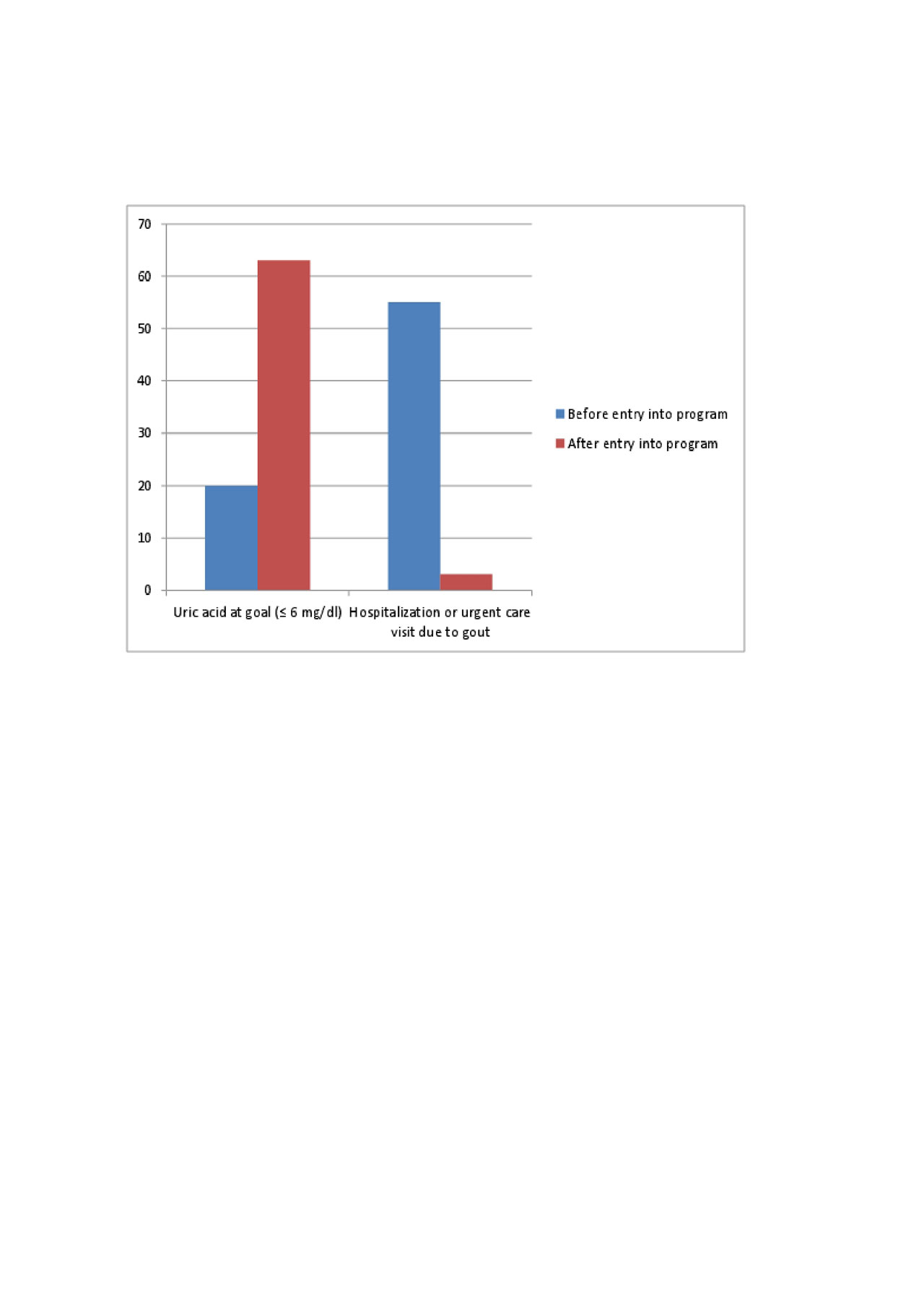Session Information
Session Type: Poster Session (Sunday)
Session Time: 9:00AM-11:00AM
Background/Purpose: Gout is the most common inflammatory arthritis in the US, and causes significant morbidity. Despite published guidelines and available effective treatment, management remains suboptimal, leading to unnecessary morbidity and increased cost of care. We have designed the gout disease management program (GDMP) to improve outcomes and to decrease healthcare cost in gout patients. To date, no such study was conducted to evaluate healthcare utilization, patients’ satisfaction and clinical outcomes.
Methods: Gout patients were seen at their usual rheumatology clinical visit and offered participation in the GDMP. Enrollees were contacted by phone every 2-4 weeks until serum uric acid (SUA) level is at goal. Data were analyzed on patients enrolled between April 2017 and May 2019. During telephone encounters, made by a rheumatology provider, recent hospitalizations since last encounter, and emergency visits due to gout were ascertained. Self-reported gout medication usage and adherence were determined. SUA levels were measured at initial outpatient encounter, when entered into the GDMP and checked every 2-4 weeks until SUA is at goal, and the most recent SUA while in the telephone phase. Patient satisfaction with GDMP (compared with usual care of office visits) was surveyed using a 5-point Likert scale.
Results: 125 patients have enrolled into the GDMP; 66 have >1 telephone encounter for follow-up and are reported here. At enrollment, 15 (23%) had a crystal proven diagnosis, 15 (23%) had tophaceous gout, and 13 (20%) had SUA levels at goal (≤6.0 mg/dl). Prior to enrollment, 7 (10%) had been hospitalized due to gout, and 23 (45%) had required emergency or urgent care service due to gout. After entry into GDMP, 65 patients were treated with a urate lowering agent coupled with appropriate prophylaxis (one patient lost to follow up). Allopurinol was prescribed in most patients (56/66, 85%) as a urate lowering therapy. Forty-one (63%) have achieved the serum uric acid level goal of ≤6.0 mg/dl. Two patients (3%) required hospitalization or visits to an emergency department or urgent care center due to gout flare (chart). Patients were extremely satisfied with the telephone encounters, 62 (95%) have rated their encounter as a 5 on a 5-point Likert scale.
Conclusion: A gout disease management program consisting of typical visit with rheumatology provider followed by a novel telephone-based follow-up management program leads to improved clinical outcomes as defined by the ACR guidelines, may prevent hospitalization and urgent care visits, and has high patient satisfaction.
To cite this abstract in AMA style:
Al Harash A, Sharma T, Dunmire B, Wasko M, Ayoub W. Efficacy and Outcomes of Telephone-Based Management Program in Patients with Gout [abstract]. Arthritis Rheumatol. 2019; 71 (suppl 10). https://acrabstracts.org/abstract/efficacy-and-outcomes-of-telephone-based-management-program-in-patients-with-gout/. Accessed .« Back to 2019 ACR/ARP Annual Meeting
ACR Meeting Abstracts - https://acrabstracts.org/abstract/efficacy-and-outcomes-of-telephone-based-management-program-in-patients-with-gout/

